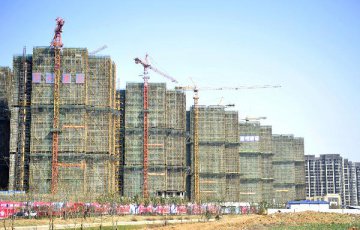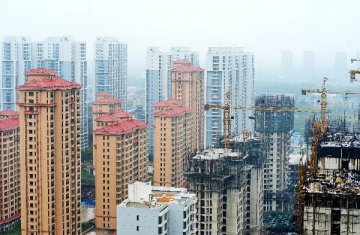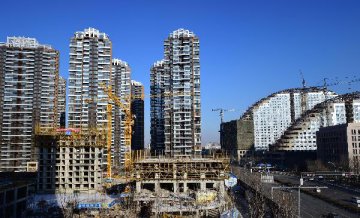
As a result of policies on the restrictions on houses purchasing and loans, the trading of new and second-hand houses in certain hot cities declined as expected. “It will be normal for such tier-1 cities as Beijing and Shanghai to see an average monthly trading volume of 10,000 to 20,000 second-hand houses in the following one to two years.” A well-known provider of statistics on houses trading estimated. Property agencies are significantly affected by the declining trading volume of second-hand houses and large property agencies such as Lianjia began to respond to it.
Shanghai to draw lottery for housing purchase
The Commission of Housing and Urban-Rural Development of Shanghai released a circular on further strengthen the regulation on the property market and the pre-sale of commercial and residential houses on May 4. It requires that new commercial and residential houses shall be sold through drawing lotteries to the public. It will strictly implement the real-name system in housing purchase and prevent charging any additional prices in any names.
The new policy released is to curb the higher prices of second-hand houses than new houses, indicated Lu Wenxi, a market analyst of Shanghai Centaline Property Agency Limited. Due to regulatory factors, the price of new houses in Shanghai property market is lower than the surrounding sub-new houses and the current benefits on the property market are re-allocated. Developers gave certain benefits to buyers. Despite the overall sluggish trading volume in the property market, certain property projects sold all houses. Some buyers even paid additional fees, which increased the burdens of rigid buyers.
An anonymous property analyst pointed out that developers are tiered with buyers with certain particular background. They required developers selling houses to them at lower prices or with better floors and household types, which squeezed the profits of certain developers. With the introduction of new policies, developers have reasons to refuse such buyers.
The above measure is good news for ordinary buyers as they can obtain equal opportunities to buy houses under the supervision of the notary office, indicated Lu. Secondly, the market is further regulated. The marketing activities used to bring mental pressure to true buyers. Now, the name of housing buyers cannot be changed. It gives no opportunities to speculators.
A Fujian-based developer indicated that developers in Fujian have sold houses through lotteries due to the short supply. However, no lotteries were conducted under the supervision of the notary office and the measures introduced in Shanghai are more standard. But Lu indicated the market effects of “lotteries” should not be exaggerated. Besides January with balanced supply and demand, the supply in the remaining three months of the first four month is fewer than the demand in Shanghai. It even reached 0.5:1 in March. As the supply and demand is not improved, the price is unlikely to decline significantly in short term.
Trading volume remains sluggish
Based on the statistics of Shanghai Centaline Property Agency, 165,000 square meters of new commercial and residential houses were traded from May 1 to 7, decreasing 12.8 percent from the previous period. The supply of new houses also declined to 81,000 square meters during the same period. The market has saw new houses of less than 100,000 square meters for two weeks and certain projects even introduced less than 100 houses. As the supply remains small, the trading volume saw no improvement. The weak performance in March and April affected the market confidence. More cities introduced regulatory policies. Based on the experiences of other cities, new policies increasingly focus on the implementation and operability.
The statistics of E-House China show that 47 regulatory policies in 44 cities were released in April. Besides, Shandong, Hangzhou and Nanjing have conducted specialized enforcement activities. More than 50 signals on tightening the regulation on the property market have been released. More regulatory policies were released and implemented in April. As at the end of April, 18 cities have implemented policies on the sales restriction. Besides cities surrounding tier-1 cities, Jinan, Xi’an, Chengdu, Xiamen, Yangzhou, Changle and other tiers-2 and 3 cities also released regulatory policies.
With the introduction of policies on restrictions on purchasing, loans and sales, the regulatory effects began to show in April and the market liquidity declined. The trading volume of second-hand houses maintained the sluggish trend in the first quarter, which also affected the new property market.
Specifically, only Shenzhen saw increases in trading volume in April among all tier-1 cities, which was mainly attributed to the relative low base in March. The trading volume in Shenzhen decreased 24 percent year on year. The trading volume in tier-2 cities also plunged significantly. Based on preliminary statistics, Xiamen, Changsha and Tianjin recorded a decrease of over 40 percent in April from March. Most tier-2 cities recorded decrease in trading volume from the previous month. Only Hefei and Shenyang saw an increase of over 10 percent in trading volume from the previous month.
The second-hand houses market continued to cool down. The prices in Beijing, Shanghai and Hangzhou saw different adjustments in April. Take Shanghai as an example, the average price of second-hand houses in April dropped about 1,500 yuan/m2 from February. For tier-3 and 4 cities, the trading volume in Changzhou and Dongguan maintained at high levels. Local governments have demonstrated their determination in regulating the market. Take Changzhou as an example, the government released new policies on housing purchase restrictions. The trading volume reached 680,000 square meters in April, representing an increase of 6 percent from the previous month. The month-on-month has been controlled within a small range.
The statistics of E-House China show that 205 parcels of land were traded in April, representing a decrease of 22 percent from March. A total of 20.56 million square meters were traded, decreasing 17 percent year on year. The average premium rate is 39 percent, declining 10 percentage points from March. Based on specific parcels, the auctioning of land will continue booming. Ding Zuyi, CEO of E-House China, believed that it is a result of policy supports. As most hot cities have set the “upper ceiling” for land prices, the results of regulation will not show in short term.
Due to policies and other factors, property developers will be more prudent in land auctioning.
Intermediary business shrinks
On the whole, the property market will see adjustments in 2017, indicated Zhang Dawei, chief analyst at Centaline Property Agency. Based on the changes in houses prices, the market is expected to see obvious price adjustments in the second and third quarters.
A provider of statistics on properties trading believed that it will become normal that the trading volume in the property market will be sluggish in the following one to two years. It will be a fatal attack to intermediary agencies. China Securities Journal found that there are few customers at the stores of property intermediary agencies. There are only one to two working staff in the stores of property intermediary agencies in downtown areas of Shanghai.
“Most people are disqualified to buy houses while qualified buyers cannot afford houses.” A property analyst pointed out. Most intermediary agencies entered into the market when it was booming. The current demands are not that high and it is normal to close certain stores. “However, rumor has it that Lianjia has closed 300 stores. I do not think so.” The analyst indicated.
Zhang Dawei, chief analyst at Centaline Property Agency, believed that some intermediary agencies closed certain stores as the government cleaned up certain stores along streets. In addition, some stores with illicit intermediary businesses also closed. On the whole, it shows the effect of this round of regulation. As the market initiated adjustments just one month before, it did not see the closing of huge number of stores. “It may be possible that many stores will be closed after the policies are strictly implemented for six to nine months.” Zhang believed.
As for the market development in the future, Ding Zuyi, CEO of E-House China, holds the following ideas. Firstly, there will be fewer policies in May and work focus will lie in implementation of policies. Cities like Chongqing and Dongguan, which saw better transaction are likely to continue to introduce regulation policies. Secondly, the second-hand house market which is more sensitive to policy will continue to be sluggish in the short term with transaction further declining. New house market will be gradually influenced by policy, and supply and demand is unlikely to pick up. With regulation policies further being strengthened, there will be more and more tier-3 and tier-4 cities facing pressure from sales. Next, divergence will occur in land auction market. In view of such factors as market and monetary policy, housing enterprises will be more cautious when making moves in land auction market.
Translated by Star and Vanessa
























Latest comments